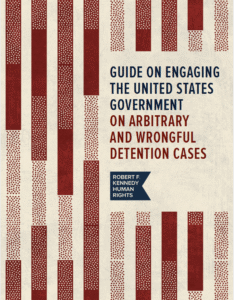(May 6, 2016 | Washington, D.C.) Robert F. Kennedy Human Rights expresses alarm at the arrest, detention, and reported abuse of prominent Egyptian human rights lawyer Malek Adly, head of the legal unit for the Egyptian Center for Economic and Social Rights.
“The arrest of Malek Adly is yet another indication of the outrageous lengths that the Egyptian government will go to silence independent voices, especially those who are standing up for human rights,” says Kerry Kennedy, President of Robert F. Kennedy Human Rights. “By arresting someone as prominent as Adly, the struggling Egyptian regime is sending a clear signal that they view human rights work as a threat to their fledgling grip on power.”
On May 5, just before midnight, Adly was arrested at the Maadi Police Station as authorities executed an arrest warrant that had been issued on April 23 in retaliation for Adly’s activism on the Tiran and Sanafir island protests. Although the Maadi Police Station initially denied his presence, his lawyers were eventually informed that Adly was being transferred to the Shubra El-Kheima Prosecution where he underwent interrogation in the middle of the night. On May 6, the Prosecution decided to extend his detention for at least fifteen days and transferred him to Tora Prison.
“By persecuting peaceful advocates and human rights defenders like Malek Adly, Egypt is in the midst of a dangerous spiral toward a country where its citizens will no longer have any peaceful means to voice their opinions independent of government,” said Wade McMullen, Managing Attorney of Robert F. Kennedy Human Rights. “A robust and vibrant civil society is a necessary element of any democracy, and the longer the Egyptian government treats activists, journalists, and civil society organizations as threats tantamount to violent extremists, the further this government travels down the path toward authoritarianism.”
Adly faces six charges including “attempting to overthrow the constitution, its republican system, and the government”; “joining an organization that seeks to impede the implementation of the law and harm national unity and social peace”; “inciting to overthrow the government”; “spreading false news”; “possessing publications that spread such news”; and “using force against a public official.”
Adly’s arrest comes in the wake of a renewed crackdown on civil society in Egypt which has included the reopening of the infamous “foreign funding” NGO trial, the unprecedented storming of the country’s Press Syndicate, and the detention of thousands involved in peaceful protests since April 25, including rights lawyers Haitham Mohammadein and Sayed El-Banna. Robert F. Kennedy Human Rights has previously highlighted the Egyptian government’s use of punitive pretrial detention to stifle free expression, in particular in the case of t-shirt detainee Mahmoud Mohamed Ahmed Hussein, who was targeted for wearing an anti-torture t-shirt and held for over two years until his release on bail on March 25, 2016.




